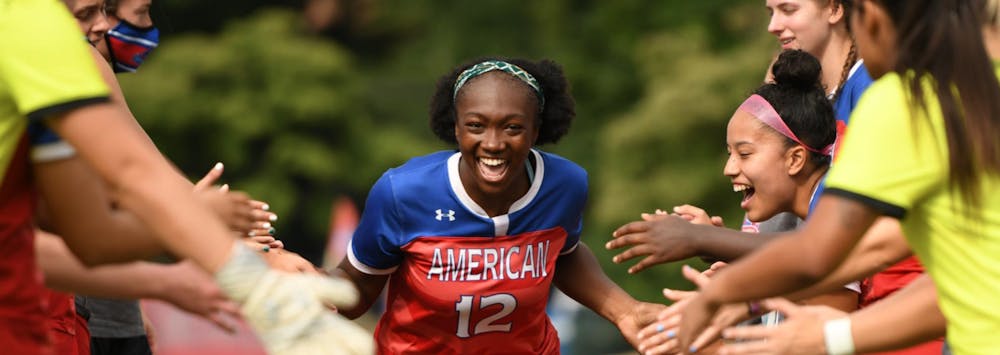The American University athletic department is full of diverse and inclusive staff and athletes, and the women’s soccer team is no exception. American University graduate student, Asia Horne, is one of five Black women on the AU women’s soccer team. Starting at the age of 8, Horne recalls why she initially began playing soccer. She says, “[Soccer] was an outlet for me to get out all the stress, tension, and anger I was feeling at the time. It was a good release.” She tells us she’s been playing club soccer since the age of 11, and while “it’s always been very competitive”, she is “playing a lot more at AU, where every day revolves around soccer.” She adds, “[it became less of] a fun after-school activity that I did.”
As a graduate student, Horne is currently the Eagles’ longest-tenured player and gearing up for her sixth and final season. The veteran team captain talked to us about what attracted her to AU, as well as what has kept her here throughout the years. “I’m from New York, and I really wanted a city environment,” Horne told us, “I chose to play here initially under a different coach, but I chose to stay here because of my new coach... I really like the culture of my team.” Horne then delved a bit deeper into her team's culture by telling us about her experience as an African American athlete on a predominantly white team. “Sometimes it’s hard, [but] it’s gotten a lot better...during certain times, especially during COVID when things were happening to revolve [around] Black Lives Matter or just issues of race in general, it took a lot of conversation and talks with other teammates for them to understand what we were going through as Black students.” She elaborates that although “it’s an extra task”, educating white people is one way she navigates being Black on a predominately white team. “At times it can be hard because you have to explain more to people who are white.” When asked if she ever felt out of place playing on a predominantly white team, Horne had this to say, “I wouldn’t say so, mainly because it's been a lifestyle almost. I’ve never been on a predominantly Black team. Soccer in general is not really a sport for a lot of minorities, in the sense that it’s very expensive. If you’re not middle to upper class, it’s really hard to play club soccer and get to this level.” With college sports bringing in a large revenue, and eyes watching from every angle, most student-athletes join the teams where they have the best shot at getting noticed. From youth intramural sports, fewer Black women play sports than White athletes, who in turn, have greater access to the benefits of sports. The sports industry is run off the exploitation of its athletes, and as many athletes fall into this cycle, playing at the collegiate level at a PWI isn’t anything new.
Furthermore, Horne attested to the impact the team’s new head coach, Marsha Harper, has had on the team in this regard. “Having a Black coach made it a lot easier, too, because those topics were important to her as well. She would help us facilitate talks around race, and I think our team got a lot more comfortable with the topic.” Having Black coaches who share similar experiences contributes to a safe space, with their wisdom on how to navigate cross-cutting issues being passed on to those who are Black as well as non-Black.
After a promising 5-9-2 season, a substantial improvement over the team’s record from the previous season of 0-4-1, Horne will look to lead the Lady Eagles to the Patriot League championships, a feat no women’s soccer team at AU has attained since 2015.



